Through 8 years of developing and implementing family planning systems with four NGO partners, we have established the solution Family Planning Plus, a comprehensive digital system supporting community-based family planning service provision, based on the Balanced Counselling Strategy Plus (BCS+). This solution proves to be flexible and impactful, as we have modified the solution for four different settings and have seen sustained positive program outcomes.
Specifically in one intervention area in Shinyanga, Tanzania with partner Pathfinder International, we have seen 70% Increase in contraceptive prevalence, 95% continuous use among clients and 15x increase in follow up visits across 4 years of performance since 2014.
We are proud of this solution and the potential for it to close the global gap in reproductive health education and access, which, according to the WHO, includes 214 million women of reproductive age in developing countries who want to avoid pregnancy but are not using comprehensive methods.
The Family Planning Plus solution, comprising of mobile applications for Community Health Workers and Supervisors, on-device reports for users to track their individual and program performance, and comprehensive program dashboards, applies to the continuum of family planning services, from the Community Health Worker counselling with the client, to facility referrals and follow up between the Community Health Worker and Supervisor. The solution supports:
-
Offline case management and decision support
-
Complex workflow, guiding systematic follow-up and visit scheduling
-
Referral coordination and tracking
-
Health worker motivation schemes including pay for performance
-
Citizen report card for client feedback and accountability
-
Mobile supervisory systems with on-device reports (accessible offline)
-
Dashboards with government reports, program indicators and dynamic analyses
-
DHIS-2 integration
At the core of this digital system is the Community Health Worker, guided by a mobile application with the Balanced Counseling Strategy + to help the Community Health Worker organize and schedule the appropriate series of client interactions needed to ensure their needs are satisfied.
Workflow part 1: Choosing a method: The workflow starts with the Community Health Worker registering a client and guiding the client through a series of questions, understanding preferences for family planning methods based on family planning goals. For instance, if the client does not want to have children, then a permanent method is an appropriate option. Otherwise, the Community Health Worker counsels on non-permanent methods. The Community Health Worker also screens the client for pregnancy and HIV/STI risk factors. pregnancy screening and assess for HIV/STI Risk assessment for the client.
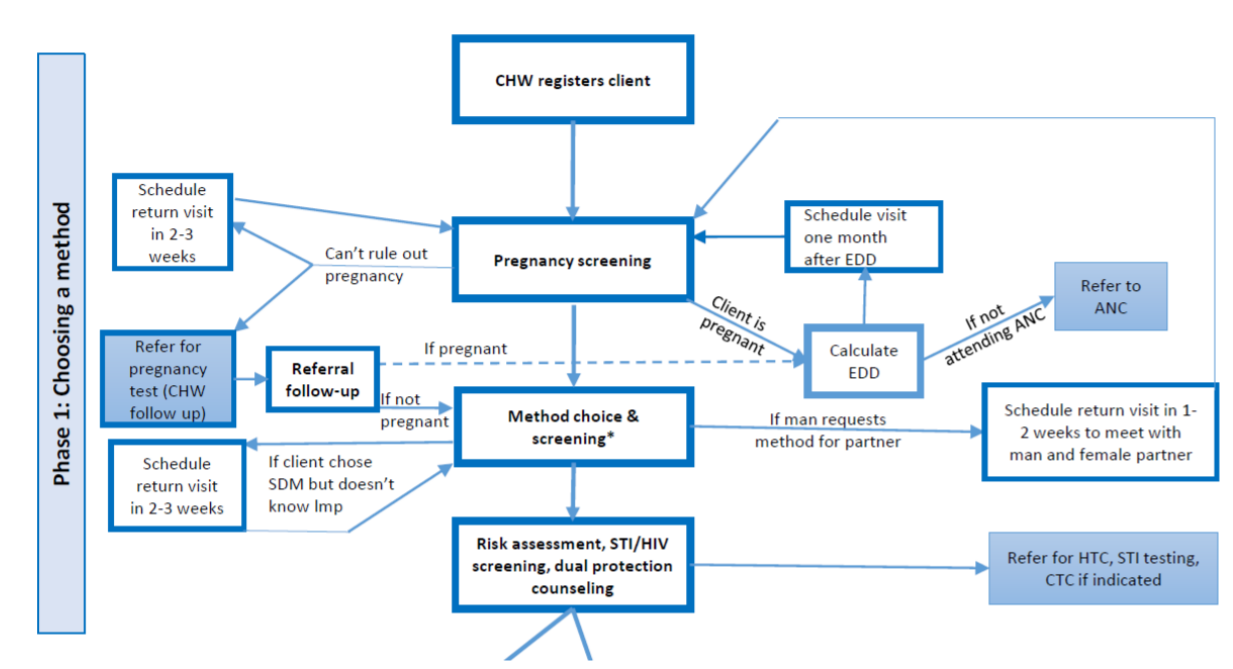
Workflow part 2: Giving method: After choosing a method that fits the client’s preferences and family planning goals, the Community Health Worker either distributes the method if available, or refers the client to a facility to receive a method. Through implementing this part of the workflow in various contexts, we have found that programs and countries have different methods available, and different cadre health worker provide different methods. Therefore, we developed Family Planning Plus to be flexible; the solution can easily turn ‘on’ and ‘off’ various methods for a health worker to provide to clients vs methods that need to be referred to a health facility.
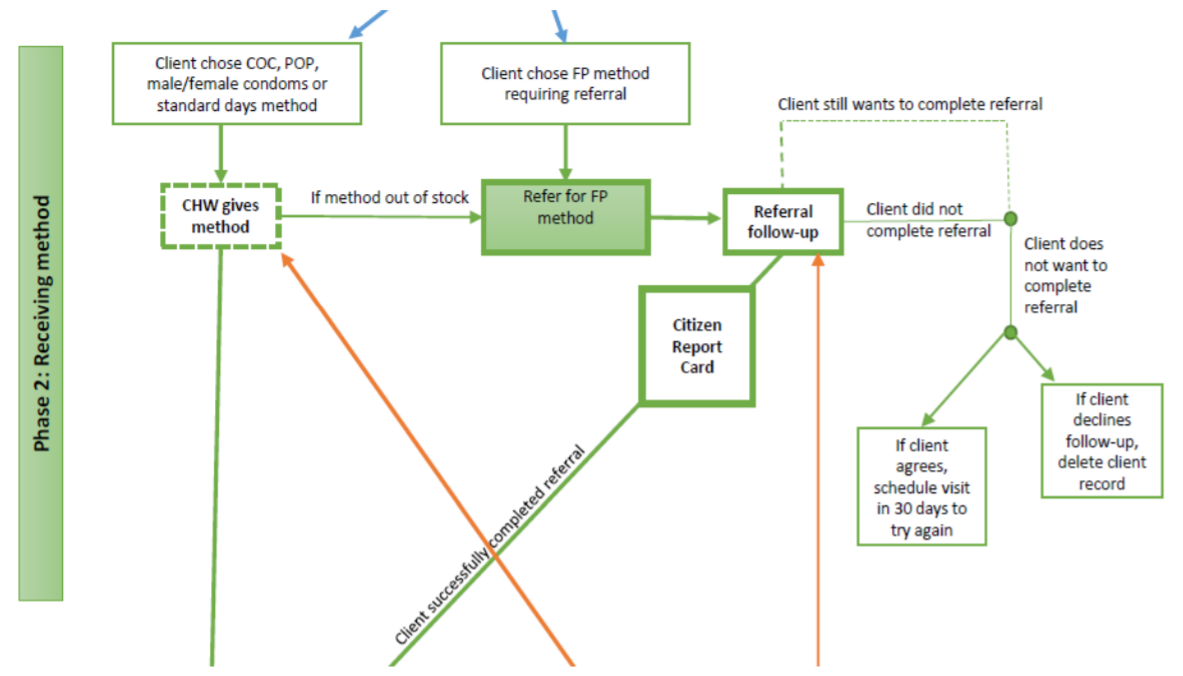
Workflow part 3: Follow-up: After distributing a method or referring for a method, the Community Health Worker schedules a visit according to the follow up plan developed in the app. For instance, after providing a method, the Community Health Worker returns after 30, 60 and 90 days for follow-up visits to make sure the client is satisfied with the method. After 90 days of continuous use, the app prompts follow up visits after 90 days (for shorter term methods) or 180 days (for long term methods). If the client switches methods, the follow-up counts start over. Additionally, The Community Health Worker follows up on any referrals made to the facility with a Citizen Report Card to capture the client experience at a facility. Since a Community Health Worker is removed from the formal health system and has a personal relationship with the client, we have found that clients are willing to give honest feedback to the Community Health Worker.
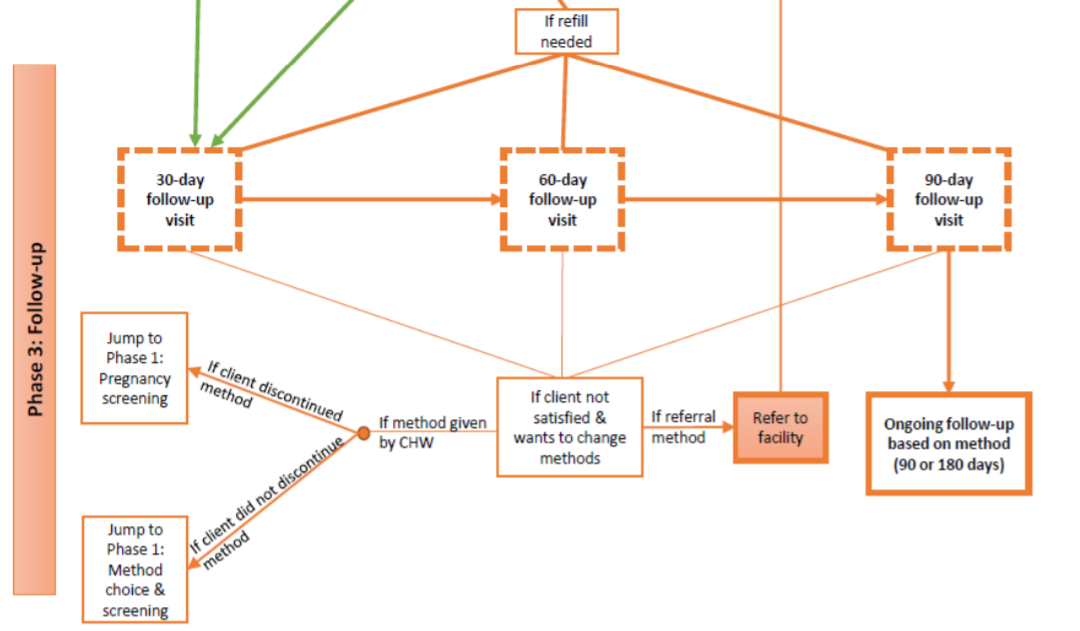
Below is a look at how this complex workflow is supported by Family Planning Plus mobile applications and dashboards.
– Case Management: A client list with information about client method use, referral status and follow up.
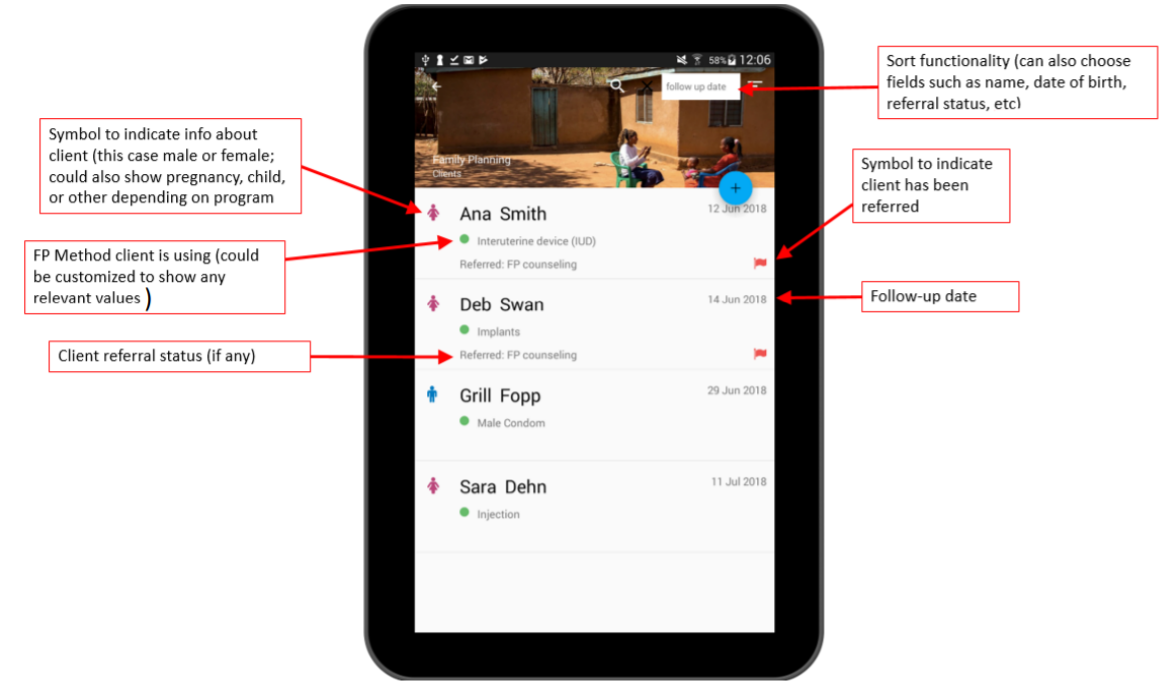
– Overview of FP methods: Interactive screens to educate clients about possible family planning methods. This can be customized based on available resources, including images, audio messages and videos.
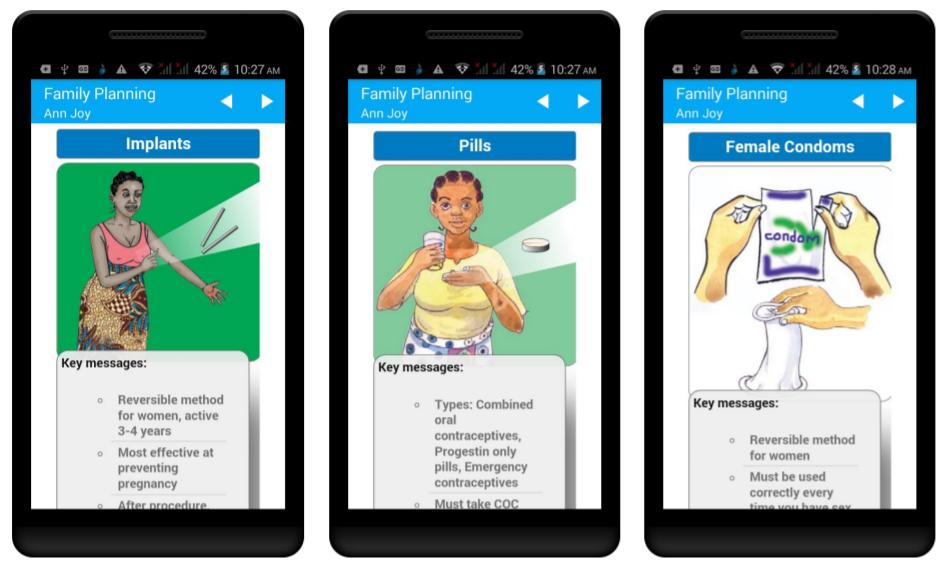
– Visit Scheduling: At the end of each visit, the app calculates a target date for follow up based on the workflow. The visit date then shows up on the client list which can be sorted in chronological order to aid in the work planning for the Community Health Worker.
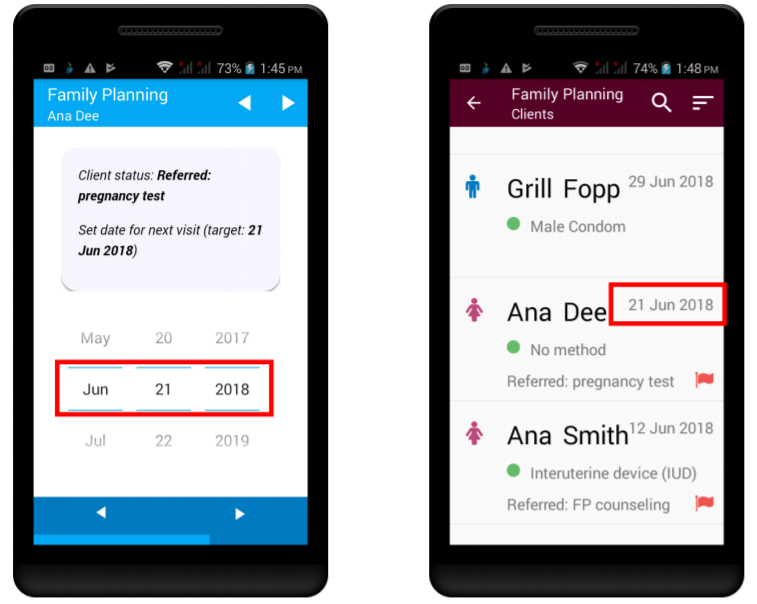
– Performance tracking & pay for performance:
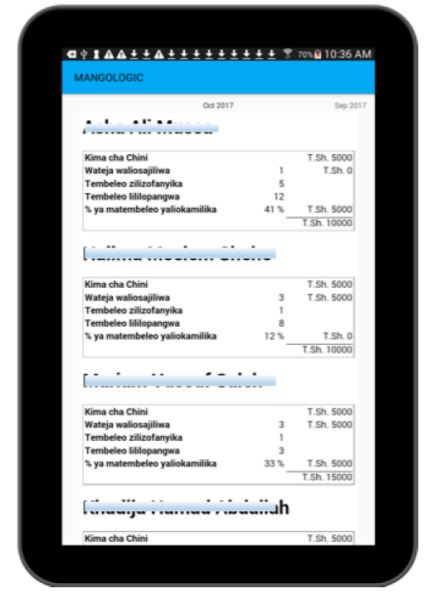
On-device tracking for Community Health Workers and Supervisors supports performance monitoring in real time. Some programs integrate a pay for performance scheme which calculates the Community Health Worker Stipend based on progress towards targets (i.e. number of new clients registered, percent of scheduled visits completed, percent of referrals completed).
The system automatically calculates the stipend which is visible on the Community Health Worker app, Supervisor app and program dashboards. Payments can be made through mobile money by downloading the report and uploading it into mobile money systems.
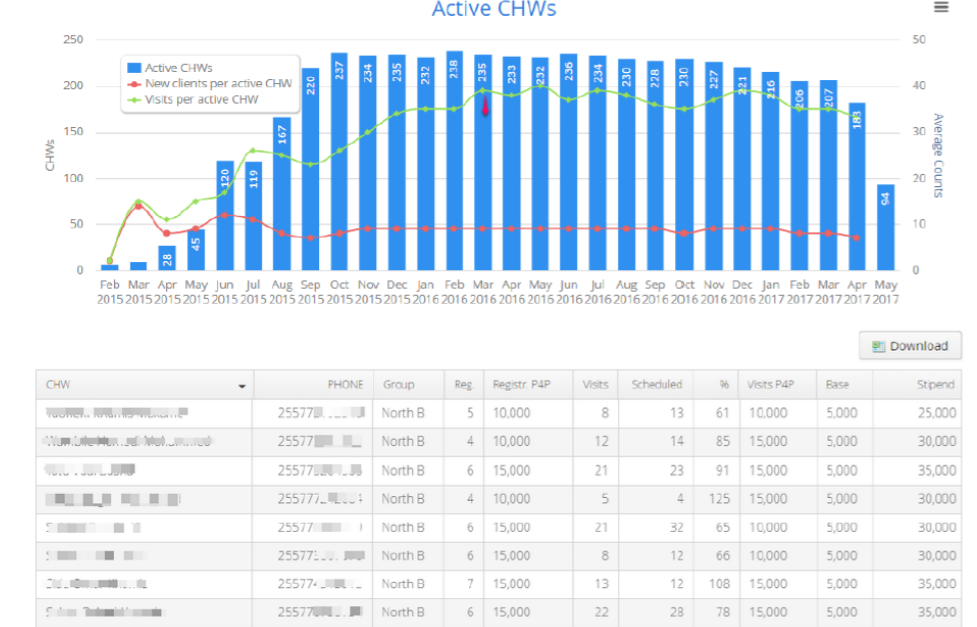
Find out more:
– View a Demo of D-tree’s Family Planning Plus: https://vimeo.com/274794382
– Read this story about the Family Planning Solution in Shinyanga, Tanzania

